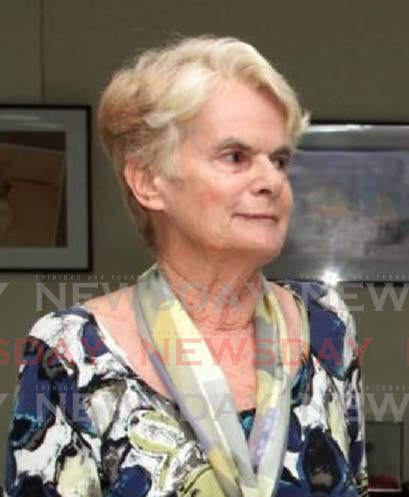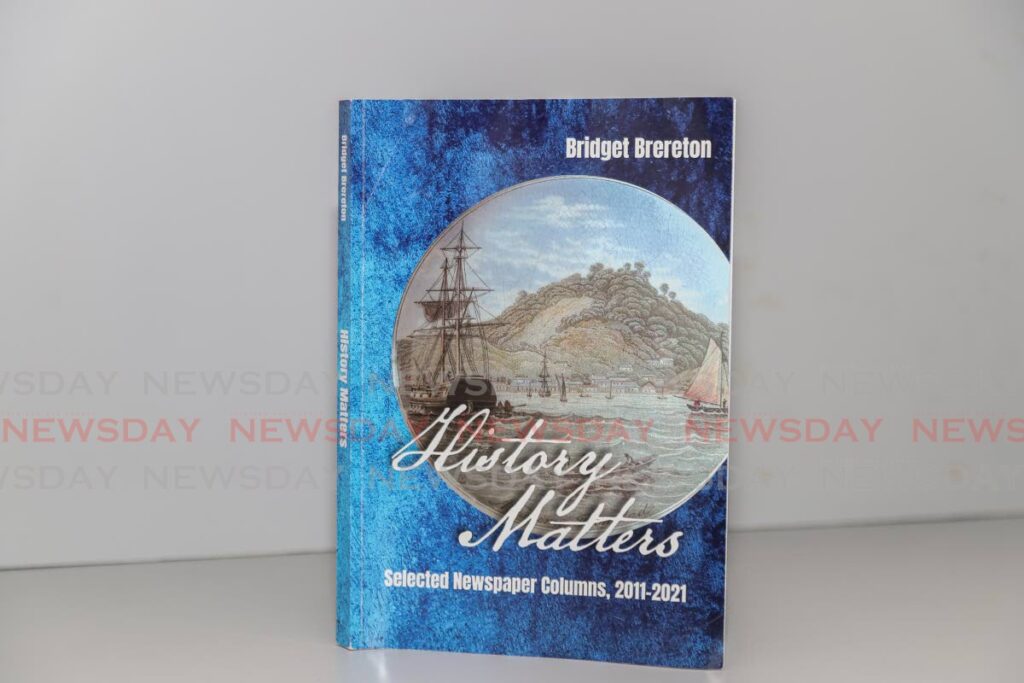Bridget Brereton: Mistress of her material

Bridget Brereton sets out her stall at the beginning of her new book, History Matters, a collection of newspaper columns published in the Express between 2011 and 2021. In the first column, which has the same title, she reports that her colleagues at UWI’s Department of History were often shocked at how little of the country’s history new students had been taught – and these were young people who had studied the subject at school.
Brereton agrees with Khafra Kambon, former head of the Emancipation Support Committee, who complained in an interview of the lack of history teaching. The interviewer responded: “We shouldn’t be enslaved by our history,” to which Kambon replied that it’s when you don’t know your own history that you can be enslaved by the past.
A further complication is that many people imagine the country has very little history, or that very little of it has been written, or both; in fact, our islands are bursting with history, which has been recorded formally and in other documents for centuries.
Brereton acknowledges that “truth” in history (as everywhere else) “is notoriously tricky.” Nevertheless, she has devoted her life to it. Not only is she a professor emerita of the university, who has influenced generations through her teaching; she’s also written, edited and contributed, directly and indirectly, to a vast number of books and other works, and given generous encouragement and support to countless other writers.
She is also a public intellectual (UWI could do with more of those these days), though she doesn’t quite match the definition she cites in writing about Lloyd Best: “Someone who fails to mind his own business.” Brereton almost always sticks to history, which is very much her business. But she gladly steps out of the academy to offer knowledge, opinion and ideas.
Brereton writes in her own unmistakable voice: quietly authoritative, reasonable, broad-minded, forthright. She is vastly knowledgeable and adept, able to inform her reader without writing down to them, and to share a lot of information in a small space without making it seemed crammed with facts.
Brereton does some gentle myth-busting, since it’s part of the historian’s job, she writes, to “expose myths, legends and popular misconceptions about the past. Even if they are cherished…” Hence she points out the lack of contemporary evidence that Canboulay/Kambule was originally celebrated on August 1, then suppressed in the 1880s; and that although Trinidad was not a traditional slave colony, nothing suggests, as some French Creole historians have argued, that slavery here was in any way more “benevolent” than elsewhere in the region. She deflates the notions that indentureship was equivalent to slavery, and Indian labourers were tricked into coming to the region.
“Columbus-bashing, though good fun, gets a bit boring after a time,” she remarks. Brereton feels the statues of former heroes now regarded as oppressors, such as Signor Columbus, should be removed, but kept in museums, not tossed into the Gulf of Paria, saying frankly that this is “partly because I’m old and middle-class.” More seriously, she believes that simply taking down such statues has already enlightened more people as to the truth about their subjects.

Among local histories, she distinguishes different varieties: the French Creole, Independence and labour narratives, for instance – but doesn’t belabour the shortcomings of any particular ideology – just as she doesn’t quibble over the faults of other historiographers, except perhaps to wish they’d cite their sources.
Sometimes there’s a glimmer of dry humour when, reading between the lines, one discovers a rebuke. She neatly puts the benighted Zainol Khan in his place when he argues in a book about Muslim history in TT that to ban the marriage of 12-year-old girls is to interfere with Muslims’ religious freedom. He has, she comments, “done his own community, and by extension the nation, a service by providing the foundation for a Muslim narrative of our past.”
Brereton may be more straightforwardly critical of more academic historical works or those by public figures. She has good things to say about ANR Robinson, but regrets that his autobiography glosses over controversial episodes of his career, such as his single step from active politician to President, and that he further mystifies his already “mysterious” tiebreaking decision after the election of 2001.
But she’s a generous commentator, sometimes almost to a fault; she may commend a book for the rarity and possible usefulness of the information it contains, when a general reviewer might focus more on its readability and literary merits.
Brereton focuses on written history, but comments several times on other forms – oral history, archaeology, photography, art – and the growing popular interest in local and family history. More emphasis on the need for its preservation in suitably equipped, widely accessible repositories, coming from her, might have carried considerable weight, though she does say, “No documents, no history.”
But this is a selection of columns, not an encyclopaedia. Even so, it contains a feast of bite-sized nuggets you didn’t know about a great many things – to cite a few at random: phases of local history, such as Dutch Tobago (Brereton emphasises how widely the histories and cultures of Trinidad and Tobago differ); that the site of the Red House, where a relatively large number of First Peoples lived from AD 125-1395, was once a “marine” settlement, far closer to the sea than it is now; she ponders the effects of the Spanish “neglect” of Trinidad.
To produce her columns, Brereton worked her way through and wrote about many books, with admirable fortitude and patience (mercifully, there’s very little here about buildings, an obsession among those interested in local history, and more than adequately covered elsewhere). She also considers people, some undeservedly obscure. Among them are the free-coloured radical feminist Emilie Maresse-Paul; Leonora Pujadas-McShine of the League of Women Voters; trade unionist Quintin O’Connor; pioneering archaeologist John Bullbrook; the scholar Oliver Cox; Alfred Charles, the first professional West Indian footballer in England (he played for Burnley and Southampton, among others).
Others are better known; Brereton explains just what some of them did to be labelled what we now call “icons.” And she describes a very select few of the people she writes about as “national treasures.” Bridget Brereton is of course a national treasure herself.
Bridget Brereton’s History Matters is published by Paria Publishing Co.

Comments
"Bridget Brereton: Mistress of her material"